1
TO BE HOPEFUL in bad times is not just foolishly romantic. It is based on the fact that human history is a history not only of cruelty, but also of compassion, sacrifice, courage, kindness. What we choose to emphasize in this complex history will determine our lives. If we see only the worst, it destroys our capacity to do something. If we remember those times and places–and there are so many–where people have behaved magnificently, this gives us the energy to act, and at least the possibility of sending this spinning top of a world in a different direction. And if we do act, in however small a way, we don’t have to wait for some grand utopian future. The future is an infinite succession of presents, and to live now as we think human beings should live, in defiance of all that is bad around us, is itself a marvelous victory. .Howard Zinn
2
But human beings are not machines, and however powerful the pressure to conform, they sometimes are so moved by what they see as injustice that they dare to declare their independence. In that historical possibility lies hope.Howard Zinn
3
The willingness to undertake such action cannot be based on certainties, but on those possibilities glimpsed in a reading of history different from the customary painful recounting of human cruelties. In such a reading we can find not only war but resistance to war, not only injustice but rebellion against injustice, not only selfishness but self-sacrifice, not only silence in the fact of tyranny but defiance, not only callousness but compassion. Human beings show a broad spectrum of qualities, but it is the worst of these that are usually emphasized, and the result, too often, is to dishearten us, diminish our spirit. And yet, historically, that spirit refuses to surrender. .Howard Zinn
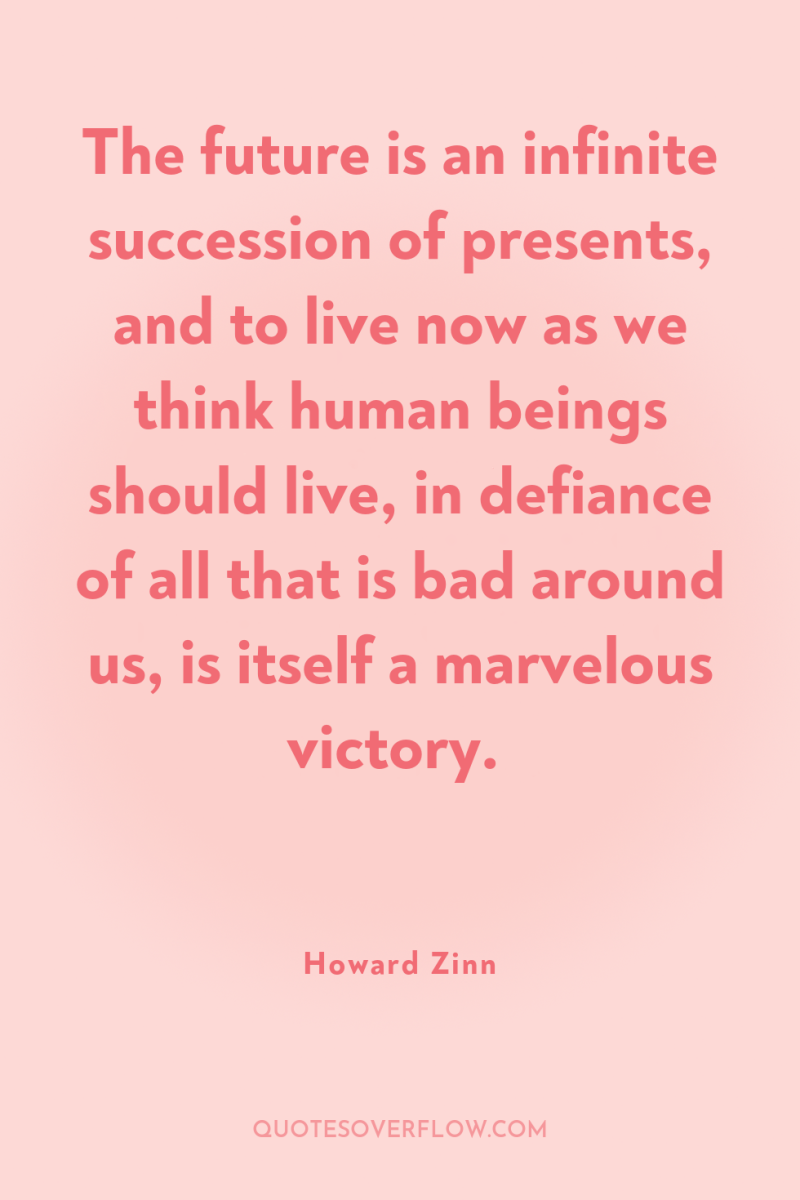
4
The future is an infinite succession of presents, and to live now as we think human beings should live, in defiance of all that is bad around us, is itself a marvelous victory.Howard Zinn
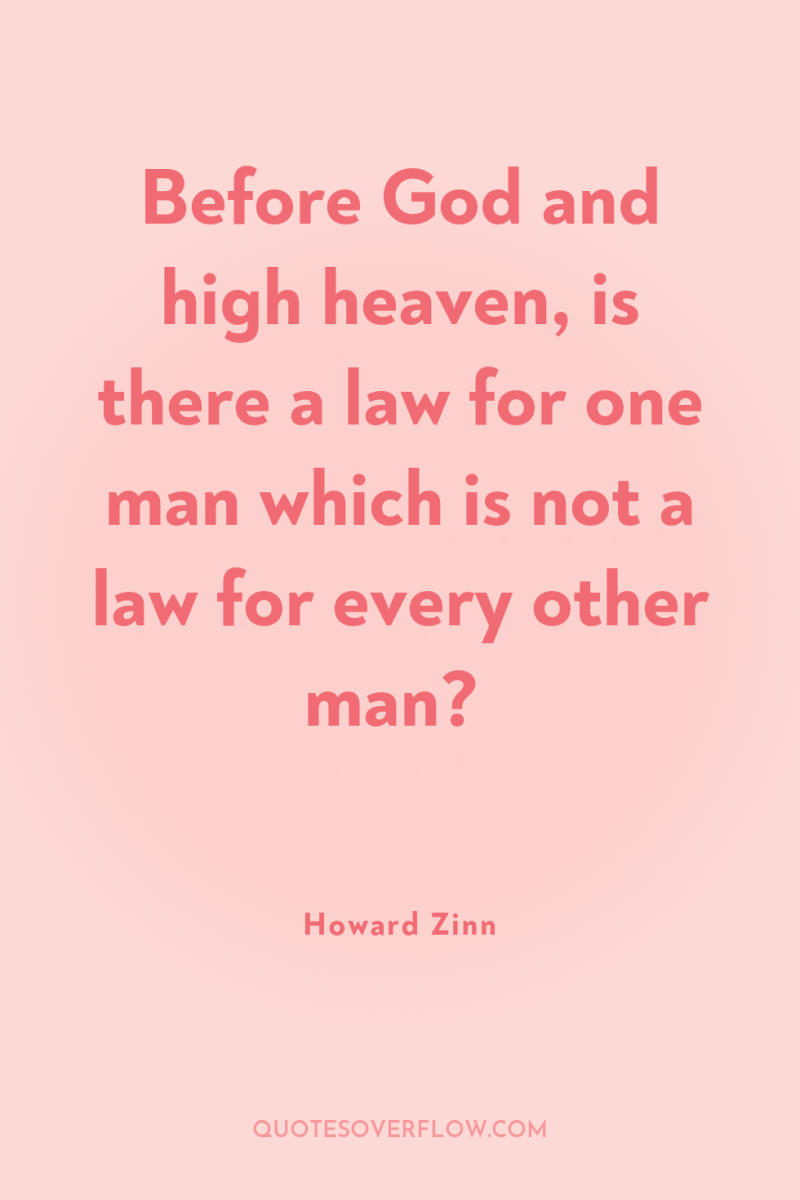
5
Before God and high heaven, is there a law for one man which is not a law for every other man?Howard Zinn
6
There is a power that can be created out of pent-up indignation, courage, and the inspiration of a common cause, and that if enough people put their minds and bodies into that cause, they can win. It is a phenomenon recorded again and against in the history of popular movements against injustice all over the world.Howard Zinn
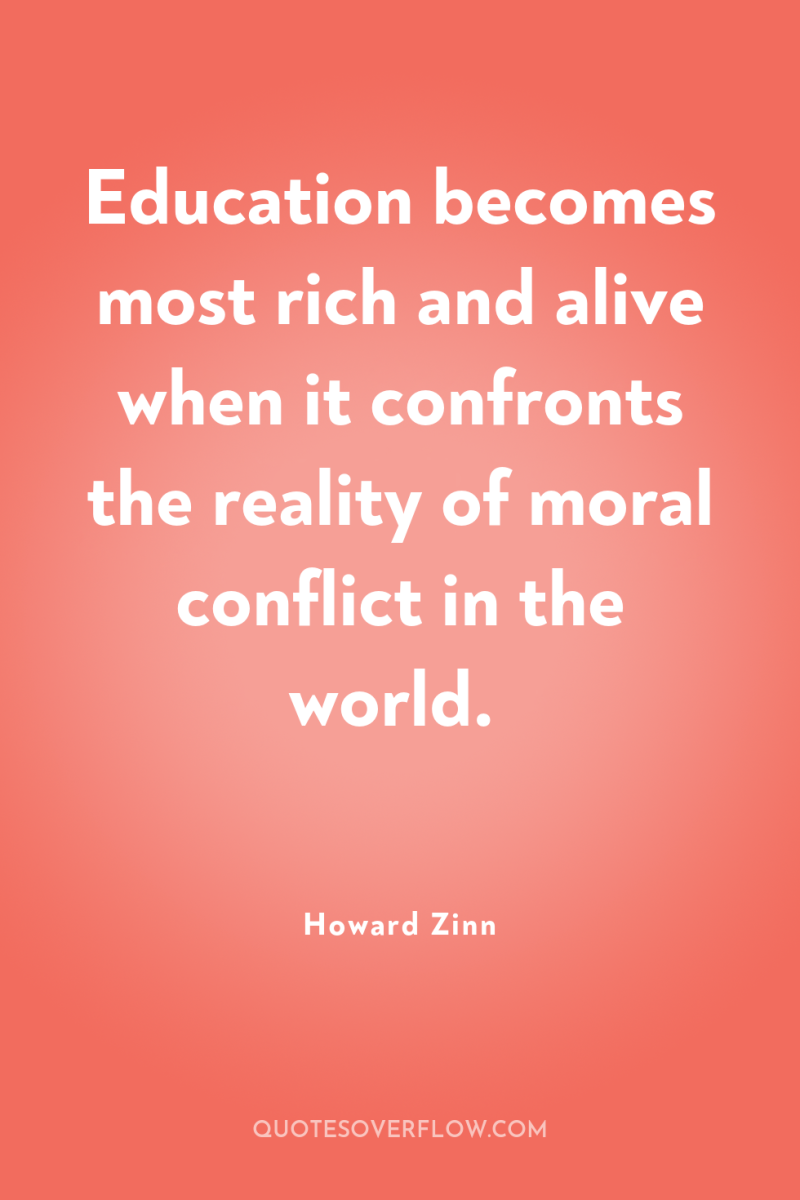
7
Education becomes most rich and alive when it confronts the reality of moral conflict in the world.Howard Zinn
8
I had always insisted that a good education was a synthesis of book learning and involvement in social action, that each enriched the other. I wanted my students to know that the accumulation of knowledge, while fascinating in itself, is not sufficient as long as so many people in the world have no opportunity to experience that fascination.Howard Zinn
9
That chain of relationships made me think of how connections are made--you read a book, you meet a person, you have a single experience, and your life is changed in some way. No act, therefore, however small, should be dismissed or ignored.Howard Zinn
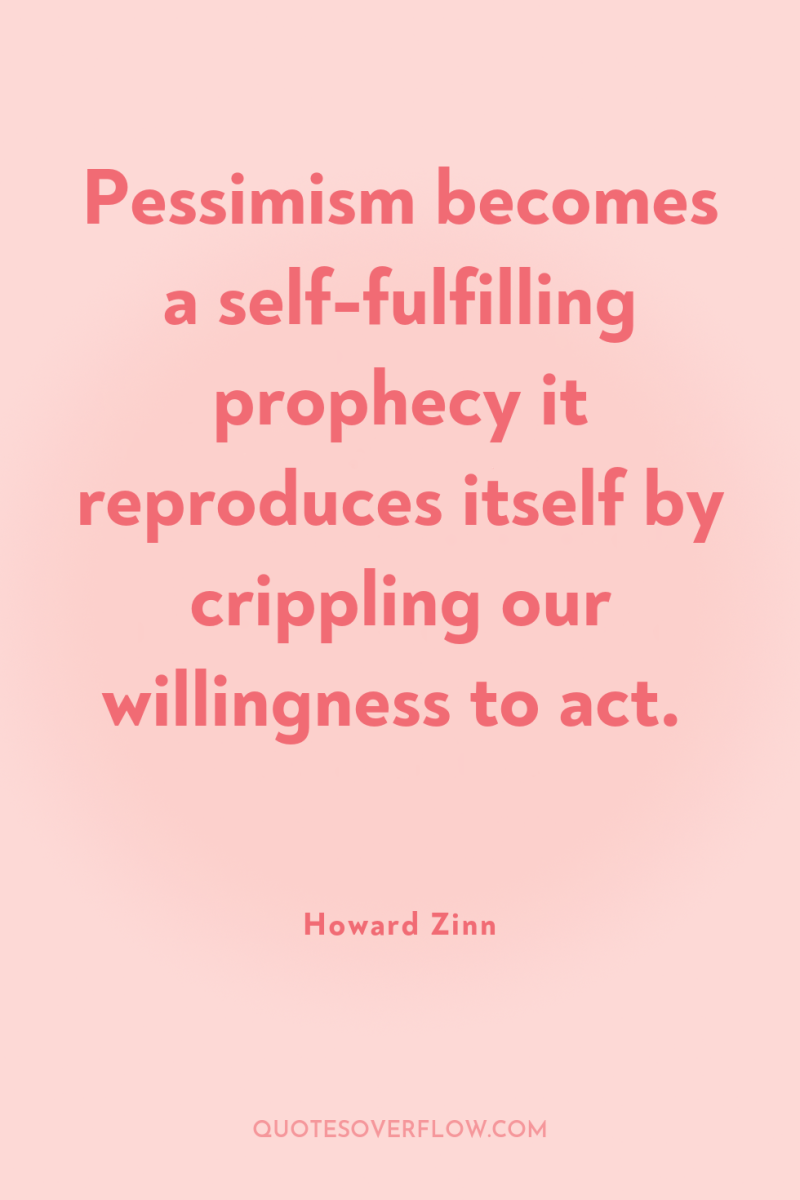
10
Pessimism becomes a self-fulfilling prophecy it reproduces itself by crippling our willingness to act.Howard Zinn
11
If history is to be creative, to anticipate a possible future without denying the past, it should, I believe, emphasize new possibilities by disclosing those hidden episodes of the past when, even if in brief flashes, people showed their ability to resist, to join together, occasionally to win. I am supposing, or perhaps only hoping, that our future may be found in the past's fugitive movements of compassion rather than in its solid centuries of warfare.Howard Zinn
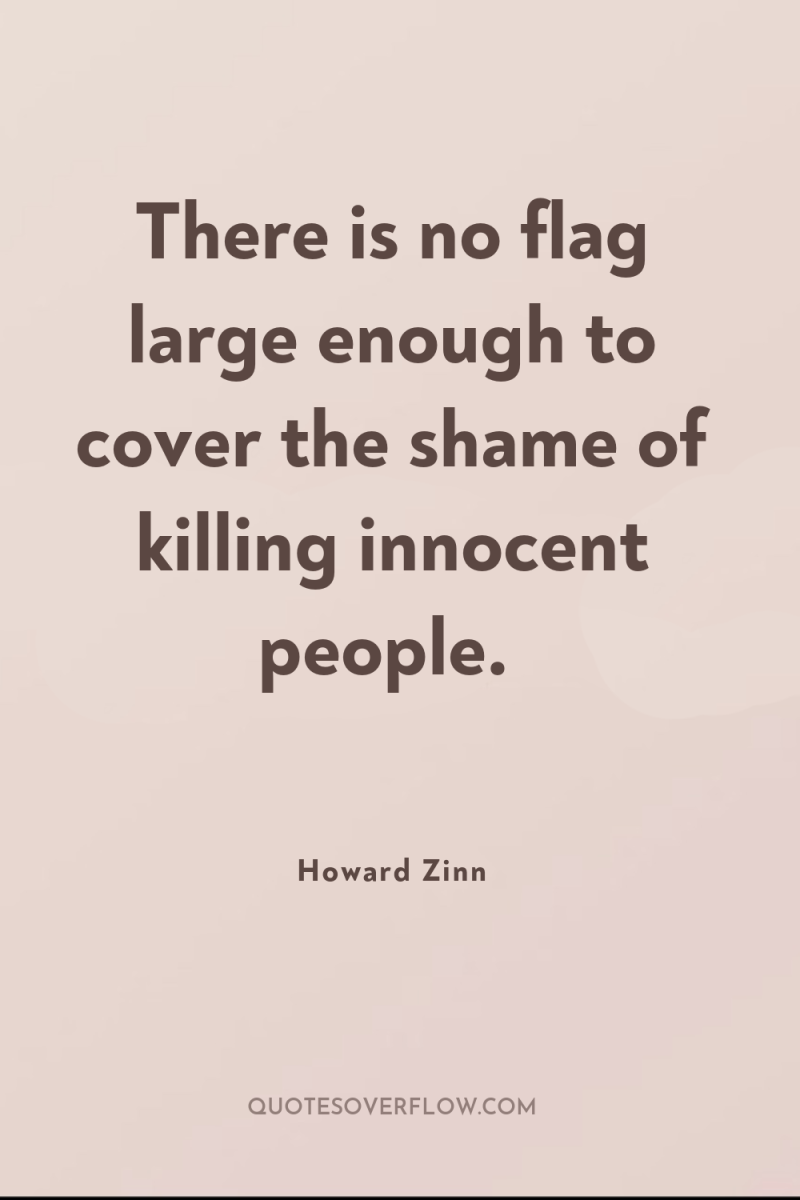
12
There is no flag large enough to cover the shame of killing innocent people.Howard Zinn
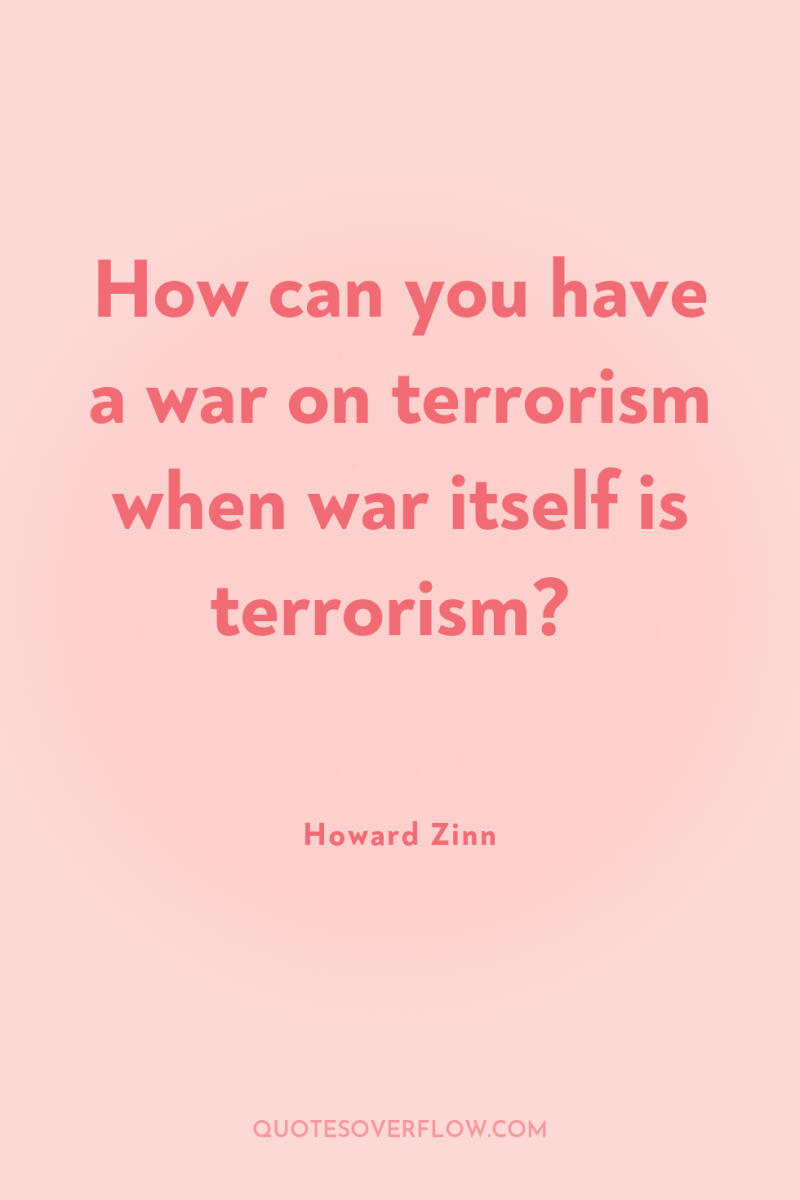
13
How can you have a war on terrorism when war itself is terrorism?Howard Zinn
14
We need to decide that we will not go to war, whatever reason is conjured up by the politicians or the media, because war in our time is always indiscriminate, a war against innocents, a war against childrenHoward Zinn
15
What struck me as I began to study history was how nationalist fervor--inculcated from childhood on by pledges of allegiance, national anthems, flags waving and rhetoric blowing--permeated the educational systems of all countries, including our own. I wonder now how the foreign policies of the United States would look if we wiped out the national boundaries of the world, at least in our minds, and thought of all children everywhere as our own. Then we could never drop an atomic bomb on Hiroshima, or napalm on Vietnam, or wage war anywhere, because wars, especially in our time, are always wars against children, indeed our children.Howard Zinn
16
The argument that there are just wars often rests on the social system of the nation engaging in war. It is supposed that if a ‘liberal’ state is at war with a ‘totalitarian’ state, then the war is justified. The beneficent nature of a government was assumed to give rightness to the wars it wages. .. Woodrow Wilson and Franklin Roosevelt were liberals, which gave credence to their words exalting the two world wars, just as the liberalism of Truman made going into Korea more acceptable and the idealism of Kennedy’s New Frontier and Johnson’s Great Society gave an early glow of righteousness to the war in Vietnam. What the experience of Athens suggests is that a nation may be relatively liberal at home and yet totally ruthless abroad. Indeed, it may more easily enlist its population in cruelty to others by pointing to the advantages at home. An entire nation is made into mercenaries, being paid with a bit of democracy at home for participating in the destruction of life abroad.Howard Zinn
17
I see this as the central issue of our time: how to find a substitute for war in human ingenuity, imagination, courage, sacrifice, patience.. War is not inevitable, however persistent it is, however long a history it has in human affairs. It does not come out of some instinctive human need. It is manufactured by political leaders, who then must make a tremendous effort--by enticement, by propaganda, by coercion--to mobilize a normally reluctant population to go to war. .Howard Zinn
18
Against the claims of a violent "human nature" there is enormous historical evidence that people, when free of a manufactured nationalist or religious hysteria, are more inclined to be compassionate than cruel. When citizens have an opportunity to learn of vicious acts committed by their own governments, they react with indignation and protest. So long as atrocities remain remote, abstract, they will be tolerated, even by decent people.Howard Zinn
19
When private bands of fanatics commit atrocities we call them "terrorists, " which they are, and have no trouble dismissing their reasons. But when governments do the same, and on a much larger scale, the word "terrorism" is not used, and we consider it a sign of our democracy that the acts become subject to debate. If the word "terrorism" has a useful meaning (and I believe it does, because it marks off an act as intolerable, since it involves the indiscriminate use of violence against human beings for some political purpose), then it applies exactly to the bombings of Hiroshima and Nagasaki.Howard Zinn
20
I'm worried that students will take their obedient place in society and look to become successful cogs in the wheel - let the wheel spin them around as it wants without taking a look at what they're doing. I'm concerned that students not become passive acceptors of the official doctrine that's handed down to them from the White House, the media, textbooks, teachers and preachers.Howard Zinn
21
Today everybody is talking about the fact that we live in one world; because of globalization, we are all part of the same planet. They talk that way, but do they mean it? We should remind them that the words of the Declaration [of Independence] apply not only to people in this country, but also to people all over the world. People everywhere have the same right to life, liberty, and the pursuit of happiness. When the government becomes destructive of that, then it is patriotic to dissent and to criticize - to do what we always praise and call heroic when we look upon the dissenters and critics in totalitarian countries who dare to speak out. .Howard Zinn
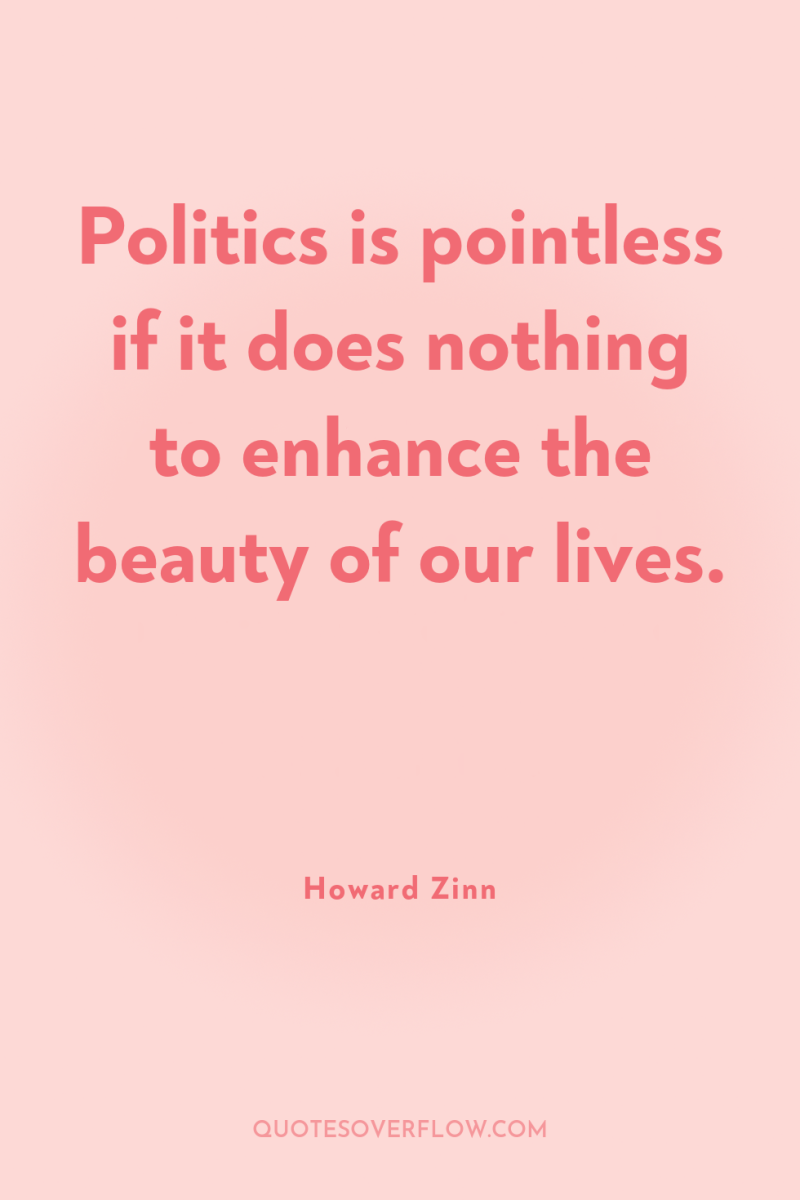
22
Politics is pointless if it does nothing to enhance the beauty of our lives.Howard Zinn
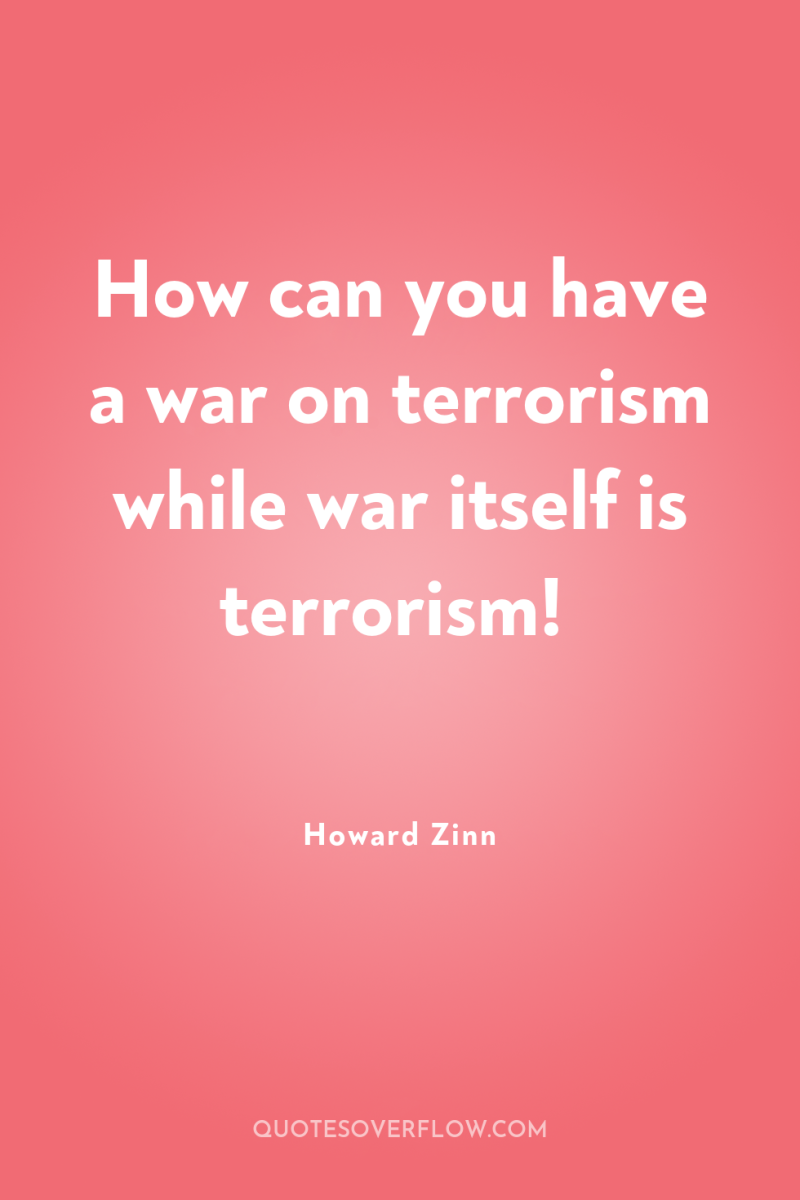
23
How can you have a war on terrorism while war itself is terrorism!Howard Zinn
24
I knew that a historian (or a journalist, or anyone telling a story) was forced to choose, out of an infinite number of facts, what to present, what to omit. And that decision inevitably would reflect, whether consciously or not, the interests of the historian.Howard Zinn
25
The power of a bold idea uttered publicly in defiance of dominant opinion cannot be easily measured. Those special people who speak out in such a way as to shake up not only the self-assurance of their enemies, but the complacency of their friends, are precious catalysts for change.Howard Zinn
26
History is important. If you don't know history it is as if you were born yesterday. And if you were born yesterday, anybody up there in a position of power can tell you anything, and you have no way of checking up on it.Howard Zinn
27
Tyranny is Tyranny, let it come from whom it may.Howard Zinn
28
My viewpoint, in telling the history of the United States, is different: that we must not accept the memory of states as our own. Nations are not communities and never have been. The history of any country, presented as the history of a family, conceals fierce conflicts of interest (sometimes exploding, most often repressed) between conquerors and conquered, masters and slaves, capitalists and workers, dominators and dominated in race and sex. And in such a world of conflict, a world of victims and executioners, it is the job of thinking people, as Albert Camus suggested, not to be on the side of the executioners. .Howard Zinn
29
You can't be neutral on a moving train.Howard Zinn
30
History can come in handy. If you were born yesterday, with no knowledge of the past, you might easily accept whatever the government tells you. But knowing a bit of history--while it would not absolutely prove the government was lying in a given instance--might make you skeptical, lead you to ask questions, make it more likely that you would find out the truth.Howard Zinn
31
Human beings, whatever their backgrounds, are more open than we think, that their behavior cannot be confidently predicted from their past, that we are all creatures vulnerable to new thoughts, new attitudes. And while such vulnerability creates all sorts of possibilities, both good and bad, its very existence is exciting. It means that no human being should be written off, no change in thinking deemed impossible.Howard Zinn
32
But by this time I was acutely conscious of the gap between law and justice. I knew that the letter of the law was not as important as who held the power in any real-life situation.Howard Zinn
33
The courtroom is one instance of the fact that while our society may be liberal and democratic in some large and vague sense, its moving parts, its smaller chambers--its classrooms, its workplaces, its corporate boardrooms, its jails, its military barracks--are flagrantly undemocratic, dominated by one commanding person or a tiny elite of power.Howard Zinn
34
Some of the New York Radical Women shortly afterward formed WITCH (Women's International Terrorist Conspiracy from Hell) and its members, dressed as witches, appeared suddenly on the floor of the New York Stock Exchange. A leaflet put out by WITCH in New York said: W I T C H lives and smiles in every woman. She is the free part of each of us, beneath the shy smiles, the acquiescence to absurd male domination, the make-up or flesh-suffocating clothes our sick society demands. There is no "joining" WITCH. If you are a woman and dare to look within yourself, you are a WITCH. You make your own rules.Howard Zinn
35
Control in modern times requires more than force, more than law. It requires that a population dangerously concentrated in cities and factories, whose lives are filled with cause for rebellion, be taught that all is right as it is.Howard Zinn
36
In his book The African Slave Trade, Basil Davidson contrasts law and in the Congo in the early 16th century with law in Portugal and England. In those European countries, where the idea of private property was becoming powerful, theft was punishable brutally. In England, even as late as 1740, a child could be hanged for stealing a rag of cotton. But in the Congo, communal life persisted. The idea of private property was a strange one, and thefts were punished with fines or various degrees of servitude. A Congolese leader told of the Portuguese legal codes asked a Portuguese once, teasingly, 'What is the penalty in Portugal for anyone who puts his feet on the ground? .Howard Zinn
37
Slavery was immensely profitable to some masters. James Madison told a British visitor shortly after the American Revolution that he could make 257 dollars on every (black slave) in a year, and spend only 12 or 13 dollars on his keep.Howard Zinn
38
I am convinced that imprisonment is a way of pretending to solve the problem of crime. It does nothing for the victims of crime, but perpetuates the idea of retribution, thus maintaining the endless cycle of violence in our culture. It is a cruel and useless substitute for the elimination of those conditions--poverty, unemployment, homelessness, desperation, racism, greed--which are at the root of most punished crime. The crimes of the rich and powerful go mostly unpunished. It must surely be a tribute to the resilience of the human spirit that even a small number of those men and women in the hell of the prison system survive it and hold on to their humanity.Howard Zinn
39
I've always resented the smug statements of politicians, media commentators, corporate executives who talked of how, in America, if you worked hard you would become rich. The meaning of that was if you were poor it was because you hadn't worked hard enough. I knew this was a lie, about my father and millions of others, men and women who worked harder than anyone, harder than financiers and politicians, harder than anybody if you accept that when you work at an unpleasant job that makes it very hard work indeed.Howard Zinn
40
Emma Willard told the legislature that the education of women "has been too exclusively directed to fit them for displaying to advantage the charms of youth and beauty" The problem, she said, was that "the taste of men, whatever it might happen to be, has made into a standard for the formation of the female character." Reason and religion teach us, she said, that "we too are primary existences..not the satellites of men.Howard Zinn
41
There has always been, and there is now, a profound conflict of interest between the people and the government of the United States.Howard Zinn
42
Perhaps the most important thing I learned was about democracy, that democracy is not our government, our constitution, our legal structure. Too often they are enemies of democracy.Howard Zinn
43
We must recognize that we cannot depend on the governments of the world to abolish war because they and the economic interests they represent benefit from war.Howard Zinn
44
The government is an artificial creation, established by the people to defend everyone's equal right to life, liberty, and the pursuit of happiness. And when the government does not fulfill that obligation, it is the right of the people, in the words of the Declaration of Independence, to 'alter or abolish' the government.Howard Zinn
45
The cry of the poor is is not always just, but if you don't listen to it, you will never know what justice is.Howard Zinn
46
Civil disobedience, as I put it to the audience, was not the problem, despite the warnings of some that it threatened social stability, that it led to anarchy. The greatest danger, I argued, was civil obedience, the submission of individual conscience to governmental authority. Such obedience led to the horrors we saw in totalitarian states, and in liberal states it led to the public's acceptance of war whenever the so-called democratic government decided on it.. In such a world, the rule of law maintains things as they are. Therefore, to begin the process of change, to stop a war, to establish justice, it may be necessary to break the law, to commit acts of civil disobedience, as Southern black did, as antiwar protesters did.Howard Zinn
47
So long as atrocities remain remote, abstract, they will be tolerated, even by decent people.Howard Zinn
48
They have the guns, we have the poets. Therefore, we will win.Howard Zinn
49
I was astonished, bewildered. This was America, a country where, whatever its faults, people could speak, write, assemble, demonstrate without fear. It was in the Constitution, the Bill of Rights. We were a democracy.. But I knew it wasn't a dream; there was a painful lump on the side of my head.. The state and its police were not neutral referees in a society of contending interests. They were on the side of the rich and powerful. Free speech? Try it and the police will be there with their horses, their clubs, their guns, to stop you. From that moment on, I was no longer a liberal, a believer in the self-correcting character of American democracy. I was a radical, believing that something fundamental was wrong in this country--not just the existence of poverty amidst great wealth, not just the horrible treatment of black people, but something rotten at the root. The situation required not just a new president or new laws, but an uprooting of the old order, the introduction of a new kind of society--cooperative, peaceful, egalitarian.Howard Zinn
50
Small acts, when multiplied by millions of people, can quietly become a power no government can suppress, a power than can transform the world.Howard Zinn
51
How skillful to tax the middle class to pay for the relief of the poor, building resentment on top of humiliation! How adroit to bus poor black youngsters into poor white neighborhoods, in a violent exchange of impoverished schools, while the schools of the rich remain untouched and the wealth of the nation, doled out carefully where children need free milk, is drained for billion-dollar aircraft carriers. How ingenious to meet the demands of blacks and women for equality by giving them small special benefits, and setting them in competition with everyone else for jobs made scares by an irrational, wasteful system. How wise to turn the fear and anger of the majority toward a class of criminals bred - by economic inequity - faster than they can be put away, deflecting attention from the huge thefts of national resources carried out within the law by men in executive offices.Howard Zinn
52
But I suppose the most revolutionary act one can engage in is... to tell the truth.Howard Zinn
53
In the problem of women was the germ of a solution, not only for their oppression, but for everybody's. The control of women in society was ingeniously effective. It was not done directly by the state. Instead the family was used- men to control women, women to control children, all to be preoccupied with one another , to turn to one another for help, to blame one another for trouble, to do violence to one another when things weren't going right. Why could this not be turned around? Could women liberating themselves, children freeing themselves, men and women beginning to understand one another, find the source of their common oppression outside rather than in one another? Perhaps then they could create nuggets of strength in their own relationships, millions of pockets of insurrection. They could revolutionize thought and behavior in exactly that seclusion of family privacy which the system had counted on to do its work of control and indoctrination. And together, instead of at odds- male, female, parents, children- they could undertake the changing of society itself. .Howard Zinn
54
I didn't want to spent a lot of close time with someone who believed that fun is a bourgeois indulgence.Howard Zinn
55
If patriotism were defined, not as blind obedience to government, not as submissive worship to flags and anthems, but rather as love of one's country, one's fellow citizens (all over the world), as loyalty to the principles of justice and democracy, then patriotism would require us to disobey our government, when it violated those principles.Howard Zinn
56
The essential ingredients of these struggles for justice are human beings who, if only for a moment, if only while beset with fears, step out of line and do "something", however small. And even the smallest, most unheroic of acts adds to the store of kindling that may be ignited by some surprising circumstance into tumultuous change.Howard Zinn
57
We need to expose the motives of our political leaders, point out their connections to corporate power, show how huge profits are being made out of death and suffering.Howard Zinn
58
We will not know unless we begin.Howard Zinn
59
The American system is the most ingenious system of control in world history. With a country so rich in natural resources, talent, and labor power the system can afford to distribute just enough wealth to just enough people to limit discontent to a troublesome minority. It is a country so powerful, so big, so pleasing to so many of its citizens that it can afford to give freedom of dissent to the small number who are not pleased. There is no system of control with more openings, apertures, leeways, flexibilities, rewards for the chosen, winning tickets in lotteries. There is none that disperses its controls more complexly through the voting system, the work situation, the church, the family, the school, the mass media--none more successful in mollifying opposition with reforms, isolating people from one another, creating patriotic loyalty.Howard Zinn
60
The Constitution. illustrates the complexity of the American system: that it serves the interests of a wealthy elite, but also does enough for small property owners, for middle-income mechanics and farmers, to build a broad base of support. The slightly prosperous people who make up this base of support are buffers against the blacks, the Indians, the very poor whites. They enable the elite to keep control with a minimum of coercion, a maximum of law--all made palatable by the fanfare of patriotism and unity.Howard Zinn
61
One certain effect of war is to diminish freedom of expression.Howard Zinn
62
In the United States today, the Declaration of Independence hangs on schoolroom walls, but foreign policy follows Machiavelli.Howard Zinn
63
If those in charge of our society - politicians, corporate executives, and owners of press and television - can dominate our ideas, they will be secure in their power. They will not need soldiers patrolling the streets. We will control ourselves.Howard Zinn